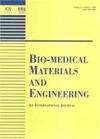RETRACTED: Mesenchymal stem cells derived from human adipose tissue exhibit significantly higher chondrogenic differentiation potential compared to those from rats.
IF 1.3
4区 医学
Q4 ENGINEERING, BIOMEDICAL
引用次数: 0
与大鼠的间充质干细胞相比,从人体脂肪组织中提取的间充质干细胞具有更高的软骨分化潜能。
背景:骨关节炎是一种影响人类和动物的常见关节疾病。其特点是关节软骨退化和关节表面烧伤。目前,还没有有效的药物治疗方法来恢复有缺陷软骨的原有功能和结构:本研究探讨了干细胞疗法在治疗涉及软骨退化的关节疾病方面的潜力,为未来的研究和治疗提供了一个前景广阔的途径。主要目的是比较人和大鼠脂肪间充质干细胞(AD-MSCs)的特征,更重要的是比较其软骨分化潜能:方法:大鼠脂肪组织取自 Sprague Dawley 大鼠,而人类脂肪组织取自脂肪抽吸物。然后使用胶原酶收获间充质干细胞(MSCs)并进行亚培养。我们对两种来源的间充质干细胞的细胞形态、细胞存活率、群体倍增时间、代谢增殖和软骨分化潜能进行了细致的评估和比较。使用三维颗粒培养法在第3周期诱导软骨分化,并通过组织学和分子分析进行评估:结果:研究结果表明,人和大鼠的 AD-MSCs 表型相同,在细胞形态、细胞存活率、代谢增殖和群体倍增时间方面差异不明显。然而,经评估,人 AD-MSCs 的软骨分化潜能明显高于大鼠 AD-MSCs:结论:目前的研究表明,有关大鼠 AD-MSCs 软骨分化的研究可以有效地应用于人类。这一发现是对再生医学领域的重大贡献,有可能促进我们对干细胞治疗关节疾病的理解。
本文章由计算机程序翻译,如有差异,请以英文原文为准。
求助全文
约1分钟内获得全文
求助全文
来源期刊

Bio-medical materials and engineering
工程技术-材料科学:生物材料
CiteScore
1.80
自引率
0.00%
发文量
73
审稿时长
6 months
期刊介绍:
The aim of Bio-Medical Materials and Engineering is to promote the welfare of humans and to help them keep healthy. This international journal is an interdisciplinary journal that publishes original research papers, review articles and brief notes on materials and engineering for biological and medical systems. Articles in this peer-reviewed journal cover a wide range of topics, including, but not limited to: Engineering as applied to improving diagnosis, therapy, and prevention of disease and injury, and better substitutes for damaged or disabled human organs; Studies of biomaterial interactions with the human body, bio-compatibility, interfacial and interaction problems; Biomechanical behavior under biological and/or medical conditions; Mechanical and biological properties of membrane biomaterials; Cellular and tissue engineering, physiological, biophysical, biochemical bioengineering aspects; Implant failure fields and degradation of implants. Biomimetics engineering and materials including system analysis as supporter for aged people and as rehabilitation; Bioengineering and materials technology as applied to the decontamination against environmental problems; Biosensors, bioreactors, bioprocess instrumentation and control system; Application to food engineering; Standardization problems on biomaterials and related products; Assessment of reliability and safety of biomedical materials and man-machine systems; and Product liability of biomaterials and related products.
 求助内容:
求助内容: 应助结果提醒方式:
应助结果提醒方式:


